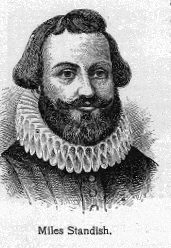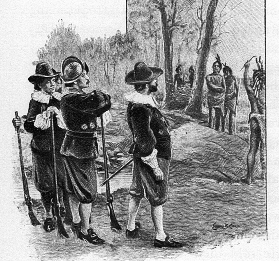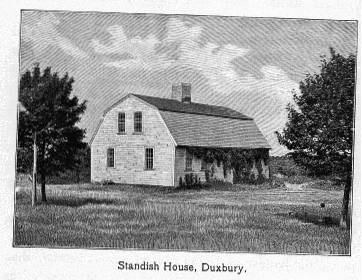|
Chapter 4 |

HOW CAPTAIN MILES STANDISH MET THE INDIANS.
Mayflower to the rock came Captain Miles Standish, with his wife Rose and their household belongings. Captain Miles Standish was a" character"! He was about forty years old. He was short, sturdy, and stout, as quick of temper as he was of eye; in fact, the Indians called him the "little pot that soon boils over." But they also called him the "strong sword," which shows how much they feared and respected his valor.He was courageous, energetic, and determined, a man of sound ideas, of good common sense, and ripe military knowledge based on real experience. He was gentle of heart, sparing of words, strong of purpose, and of excellent judgment. It was a great good fortune that gave to the first Massachusetts colony so valiant a defender, so faithful a comrade, and so excellent a soldier as Captain Miles Standish.30 |
|
31 Though one of the Puritan Pilgrims, he was no Puritan. He came of the old Roman Catholic family of Standish of Duxbury Hall, in the English county of Yorkshire. Defrauded of his rights and his inheritance when a young man, he went across the sea to Holland, and there enlisted, like other English soldiers, in a Dutch regiment. He made friends in the Separatist colony at Leyden, became interested in their plans, and, being of a restless and adventurous disposition, joined himself to the company of Pilgrims, and embarked with them on their uncertain voyage to the New World. He was a fine soldier, and was looked upon by his companions as the one best fitted as a leader in all affairs of danger or of defense. He had signed the compact for mutual protection in the cabin of the Mayflower; he led the first exploring party at Cape Cod; and had headed the landsmen who made that bolder voyage across the bay to Plymouth. Even before the landing of the Pilgrims at the rock, he had seen and scattered at Eastham, on " the cape," certain of the scarce and unreliable Indians who had spied upon, threatened, and, on one occasion, really attacked the newcomers on the Massachusetts shores; in memory of which this place for years retained the name the Pilgrims gave it—the " First Encounter."These Indians were members of one or another of the twenty tribes of red Americans who then inhabited the present State of Massachusetts. But their numbers were small, and it was because of this that the Pilgrims of Plymouth were able to occupy and hold without molestation the fertile fields that lay about the place of landing and settlement.
|
|
32 once upon a time that section had been fairly well peopled with Indians. But a few years before the coming of the Pilgrims a fatal epidemic had swept across southeastern Massachusetts, and but few Indians had been spared. Those who lived had joined other tribes, leaving their corn fields and hunting grounds uncared for and unoccupied. Of these the Pilgrims took possession, and after they had built the half-dozen log huts of their little settlement upon a street (now known as Leyden Street) starting from the rock and running up to the hill, Captain Miles Standish had raised on this hill a strong platform, upon which he mounted a few cannon, to protect the little settlement below. They passed their first terrible winter there on Leyden Street, It was really not a terrible one, as New England winters go, but it was fatal to those English people unused to the climate, the changes, and the quick consumption and deadly pneumonia they led to. Then as soon as spring fairly opened, the little remnant of fifty-two seasoned ones set about planting and farming the Indian plantation.In this farm work they were greatly helped by an Indian with a story. His name was Squantum. He had belonged to the tribe that owned and occupied the site of Plymouth; but a few years before he had been kidnapped by a roving party of English sailors, taken to Spain in captivity, rescued by a philanthropic Englishman, taken to London, where he had lived as a servant, and finally had drifted back to his old home and hunting ground at Plymouth. But while he had been abroad the fearful epidemic |
|
33 had killed or scattered all his tribe; so Squantum became a wanderer, and at last joined himself to the warlike tribe of the Wampanoags, who lived in what is now the region of Taunton, New Bedford, and Bristol.Squantum was brought to Plymouth and introduced to
:the Pilgrims by a wandering Indian named Samoset. He became very
friendly Squantum proved a great help to these inexperienced Englishmen who wished to become American farmers and fishermen. He told them all about the Indians in that country, helped them to make friends, and afterwards to arrange a treaty with Massasoit, the chief of the warlike Wampanoags. He sold them the land which they had " squatted upon" at Plymouth, and which they looked upon as belonging to Squantum as the last living male heir of his lost tribe.He told them what to plant and how to plant it; he explained to them all about Indian corn, which was a new cereal to the English Pilgrims, but which often became the mainstay and salvation of the colony. In fact, Squantum proved of so much value to the Pilgrims as friend, guide, farming expert, interpreter, go-between, and companion that one recent historian declares that Americans owe a great debt to the Indian Squantum, and that he better deserves from Mas- |

34
for an acquaintance with Indian corn and the knowledge of how to live in America, both of them brought about by this very friendly and "traveled" Indian, made the colony of Plymouth not only possible, but permanent. It was Squantum who brought into friendly relations with the white men the big chief of all the Indians thereabouts,—Massasoit the Wampanoag, —and we can picture to ourselves Captain Miles Standish and his six musketeers following Squantum along the town brook to the point where Massasoit and his dusky bodyguard waited to be received. A salute was fired, and after that the "guest of the colony" went back with Standish and Squantum to the town, where, in a house especially fitted up for his reception with cushions and a green carpet, the governor met the chieftain and concluded that treaty of peace and friendship of which I have spoken. This treaty was |
|
35 faithfully kept, both by the red men and by the white, for more than fifty years. It was finally broken by bad white men who were newcomers in the colony, and thus brought about a bloody war. But the real Pilgrims and the honorable Wampanoags kept it loyally, and in this the Pilgrims of Massachusetts set an example which William Penn followed to such excellent advantage when lie attempted the peaceful founding of Pennsylvania. Probably the "moral influence" of Captain Miles Standish and his "thunder-making" muskets counted for considerable with Massasoit, for these were present at the making of the treaty. The Indians, indeed, had a wholesome fear of the "little captain of Plymouth" and his slim guard of matchlock men.Later, when the bad boy of the colony, young Jack Billington, broke the rules and wandered off, only to fall among the Indians, Squantum and Captain Standish found him and brought him back. After that, when Squantum was captured by certain rebellious braves of Massasoit’s tribe who objected to friendship with the white men, and proposed to kill Squantum,—the "mouth of the Englishmen," as they called him,—Captain Miles Standish led his picked soldiers against the rebels, and forced them to give up Squantum and obey Massasoit. When an Indian conspiracy aimed at the destruction of the white men’s settlements, —which began to extend along the coast after Plymouth had proved itself a success,—Captain Miles Standish straightway led his little army of a dozen men against the hostiles, who were not of Massasoit’s tribe, seized the ringleader of the con- |
|
36 spiracy, killed two Indians who attempted to interfere, and by his stern and determined manner so surprised and overawed the conspiring savages that they quickly fled, leaving their leader a prisoner in the "little captain’s" hands, and never again attempted to interfere with those whom the "strong sword" protected. So, with firmness, decision, fairness, and friendship, with a show of force when necessary, and with real fighting if pushed to it, but always with justice and for the ends of peace and security, Captain Miles Standish met the Indians of Massachusetts, and always came off conqueror. It was because of his courage and firm front, quite as much as because of the honor of the Pilgrims in treaty keeping, that the Indians of that section were for so many years peaceful and friendly. It was because of the valorous captain of Plymouth, the trusted defender of the colony in its days of weakness, its honored representative in England in the days of its firm establishment, that the English colonists along the south shore of Massachusetts were enabled to gain and keep a footing in the section which their pluck, their faith, and their persistence first colonized and afterwards developed.But, in spite of his courage and firm front, Captain Miles Standish, if we may believe the legends, had not the pluck to plead his own cause when he wanted a wife. I have told you that there came to Plymouth with Captain Standish his wife Rose. But she did not live through that first dreadful winter, when the harsh, Massachusetts east wind laid so many of the unseasoned Pilgrims low. |
|
37 The colony, to succeed, must be a colonyof homes; and in such an association it was, as the Bible assured the Pilgrims, "not well for man to live alone. So Captain Miles Standish decided to take another wife, and his choice fell upon Priscilla Mullens, daughter of one William Mullens, who with his wife and two children came over in the Mayflower. But Captain Standish’s wife Rose had only been dead about three months, and the captain, either for this reason or from some other cause, did not feel like him self asking Mr. Mullens for his daughter; so he prevailed upon his young friend John Alden, the cooper, who had joined the Pilgrims at Southampton, to interview Mr. Mullens. The interview with Priscilla’s father was entirely satisfactory. Mr. Mullens was perfectly willing to have the main reliance of the little band of colonists as his son- - in-law. But the Puritan maiden had no desire to marry the fiery little captain, especially when she greatly preferred the handsome young cooper, and was certain that he was proffering the captain’s request, not from choice, but from duty, and because the captain had asked him, as a friend, to be his deputy. So when her father said yes to the captain’s suit, Priscilla looked at John Alden and asked that famous question, "Why don’t you speak for yourself, John?Evidently John did speak for himself, for the records tell us that in the spring of 1621, after that deadly first winter had left Priscilla Mullens an orphan, she married John Alden,—the second wedding in the colony. Evidently, too, the captain bore no hard feelings |

38
that John Alden and his wife built a house near to that of Captain Standish and his wife, and that in after years John Alden’s daughter married Captain Standish’s son.That is the true story of John Alden and Priscilla, and of Miles Standish’s courtship, concerning which Massachusetts’s most famous poet wrote an equally famous poem. Though it may be wrong as to details and dates, the poem is what makes these three persons of the Pilgrim days historic. For, more than dates and dry facts, Longfellow’s delightful romance gives to the age it cele |
|
39 brates in verse an atmosphere of gentleness, kindliness, purity, and peace that glorifies those days of hardship which suggested it, that ennobles the lovers, and makes the doughty little captain of Plymouth an honored and heroic figure.Honored and heroic he certainly was,—the colony’s strong arm, its defense and sword; and the tall shaft on Captain’s Hill in Duxbury, which commemorates his valor and recites his praise, is not more a landmark than is Captain Miles Standish himself to us who, to-day, read of that age of effort, privation, and persistence. Governor Carver died from an April sunstroke, and William Bradford, the runaway Austerfield boy, was elected by his fellow-colonists, in "town meeting assembled, " Carver’s successor as governor of Plymouth.The colony grew slowly,—but it grew. Colonists came over the sea to begin a new life in the Plymouth plantation; a new charter was obtained that gave them permission from the king to live in Massachusetts instead of Virginia; in twenty years the colony was free from debt; new settlements were started as offshoots along the shore; and for all its growth and strength no two men deserve more credit, or should be held in higher esteem by Americans, than Governor William Bradford, of beautiful character, and Captain Miles Standish, the Christian soldier. |
 because they were Englishmen,— countrymen of the good Englishman who
had rescued him from slavery, rather than of the wicked Englishmen who
had kidnapped him.
because they were Englishmen,— countrymen of the good Englishman who
had rescued him from slavery, rather than of the wicked Englishmen who
had kidnapped him.